Things seem different. You may have noticed others around you changing the way they work. Cars disappearing from the company parking lot. Cubicles sitting empty. Family members mysteriously earning more money. Friends suddenly having free time in the middle of the week. They’ve all taken ownership of their future.
“To really get yourself on the road to financial freedom,” says author and success coach Tony Robbins, “the first step really is deciding you’re no longer just going to be a consumer. You’re going to be an owner…. You’ve got to decide, instead of being the chess piece, I’m going to become the chess player.”
Today the chess players, as Robbins calls them, are all part of the YouEconomy, the growing global network of people who are taking the future of work into their own hands. They’re sharing resources and technology, taking gigs through job sites, creating freelance businesses and innovating methods of generating income. Folks in the YouEconomy are applying their experience in new ways, learning new skills and tapping into endless resources for training and support. They’re designing their lives, carving out time for family and building professions based on their passions. Along the way, the friends they’re making, people they’re meeting and places they’re seeing are enriching their lives beyond what they thought was possible.
Related: Welcome to the YouEconomy
They’re living the way they want, doing the things they want and making as much money as they want in the bargain.
“I knew I was doing the right thing. I finally had control of who I worked with and what I worked on. I finally had control of my own life.”
According to a survey commissioned by SUCCESS and conducted online by Harris Poll in May among more than 2,000 adults, one-third (33 percent) of U.S. adults have earned income in the YouEconomy in the past 12 months.1 For a majority (71 percent) of adults working in the YouEconomy these earnings are a supplemental source of income.
Take Eric Johnson* as a perfect case study. Johnson used to work for a respected company. He worked from 8 a.m. to 5 p.m., got two weeks’ annual vacation and earned a discount on his health insurance. He sat in a cubicle all day. He was told when he could eat, how he could dress and what he could work on.
But Johnson dreamed of freedom. He dreamed of being fulfilled by his work. He dreamed of being in control of his time, money and talents. Then one day, he was.
How? Johnson joined the YouEconomy.
It didn’t happen all at once, although Johnson now knows people who jumped into the YouEconomy with both feet and never looked back. For Johnson the transition to freedom was slow and steady, based on research and solid proof that what he was doing differently would work. It made him nervous as he prepared to make the leap. He worried. This was his professional future at stake. He’s had no regrets ever since.
Much like a secret society that’s finally out in the open, the YouEconomy has been around for a while. But as with any secret, when the timing is right and the means of communication are available, the secret gets out.
Entrepreneurship has existed for thousands of years, and the idea of part-time work to supplement a primary income isn’t new. But these ingredients alone weren’t enough to spur the revolution that is the YouEconomy. It has taken a specific mix of technology, timing and economic evolution to create the right environment for the YouEconomy to thrive and, in doing so, come out of the shadows. And consumers are responding to the rise of the peer-to-peer business model. The SUCCESS survey found that about four in 10 U.S. adults (42 percent) have used, hired, rented or purchased at least one YouEconomy service in the past 12 months—and those U.S. adults working in the YouEconomy are significantly more likely to do so than those not working in the YouEconomy (64 percent vs. 32 percent, respectively).
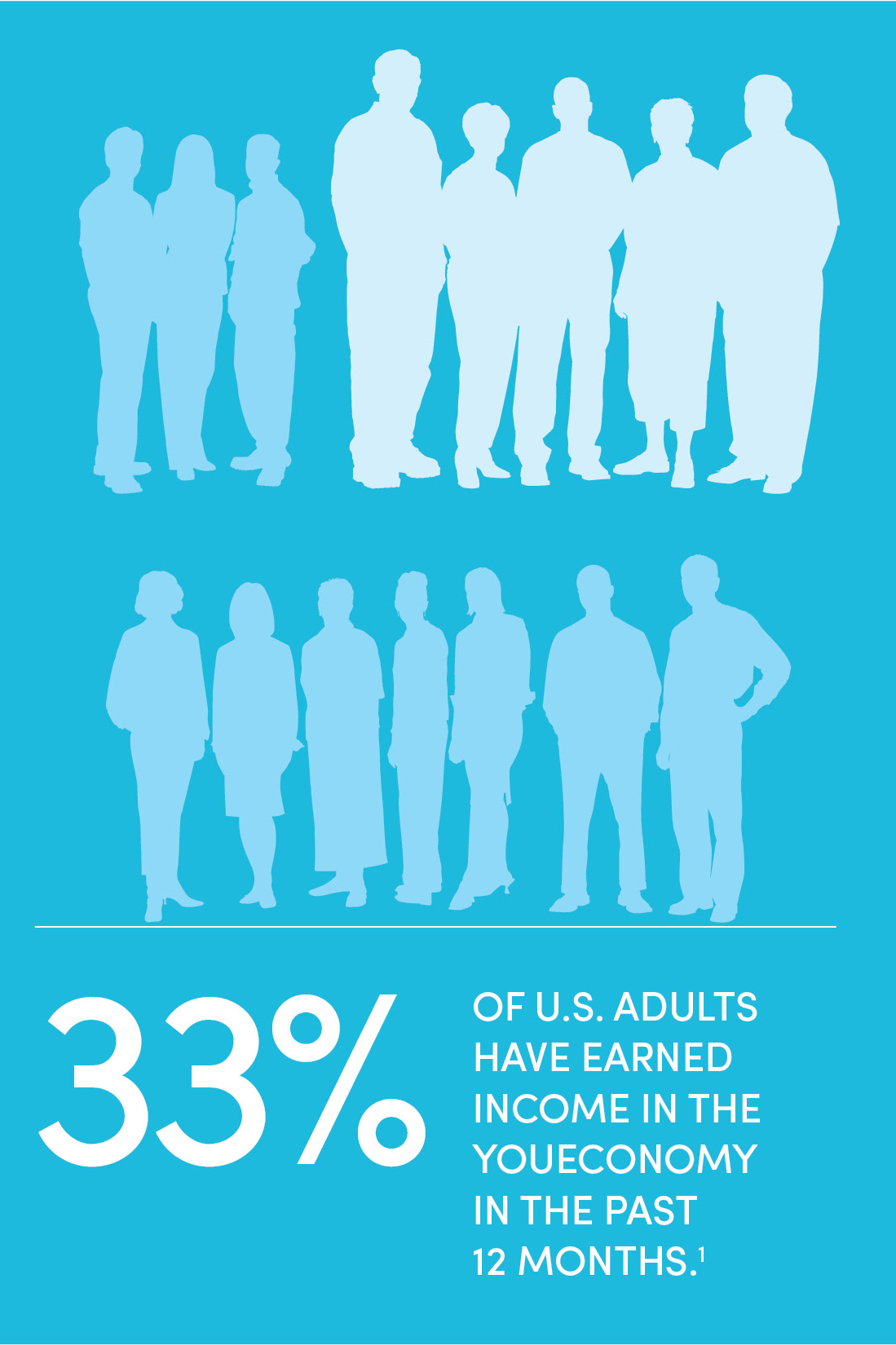
The first glimmer began in the 1990s, when a couple of companies tried creating on-demand services using what was then very limited technology to achieve their goals. A grocery delivery company called Webvan tested the burgeoning internet to create an on-demand grocer, but the shortage of homes with internet connections bankrupted the company by 2001. Similarly, a company called Kozmo tried delivering entertainment such as video games, movies and magazines within an hour, but the lack of technology sent them packing after three years.
These companies failed not because their concepts were bad, but because they were ahead of their time. By 2011, the U.S. Census revealed that 71.7 percent of U.S. households were using the internet, creating a snowball effect within the YouEconomy ever since. “The internet makes it practical. The end,” says investor, author and entrepreneurial evangelist Gary Vaynerchuk. “You know, our parents and grandparents didn’t have that luxury…. Now after 20 years, the consumer internet is at scale and people can jump in.”
Thanks to online purchasing power and the once-government-owned technology of GPS, people with visions of an innovative marketplace can make those visions come to life. And the implication will only grow from here as technology accelerates, according to abundance-minded futurist Peter Diamandis, a SUCCESS Ambassador.
“As individuals, we are now able to do what only large corporations and governments could do 20 years ago,” Diamandis says. “I want to have [people] understand the power of an abundance mindset and how the world is getting better at an extraordinary rate, how to tap into the crowd for capital, for technology, for solutions.”
As currently constructed, the YouEconomy is an umbrella over a handful of movements with disparate labels. Parts of it, along with other developments toward economic freedom and flexibility, have been referred to as the sharing economy, on-demand economy, gig economy and freelance economy.
The demographics are surprising. The YouEconomy encompasses all ages, ethnic backgrounds and education levels. According to last year’s Kauffman Index, small business activity is up in 38 of 40 metropolitan areas and 49 of 50 states and small business owners are becoming increasingly ethnically diverse.
As diverse as the people in the YouEconomy are, they generally have three things in common:
- They have more control over how they spend their time than the average employee.
- They have more control over their income than the average employee.
- They are actively learning and exploring new ways of creating prosperity.
If you recognize your dream in this list, that’s good news.
But what does all of this have to do with you or Eric Johnson?
Related: The YouEconomy: The Power Is Yours
The Dream Is Real
How long have you wished you could make more money? Or have more time with your loved ones? Or leave a lasting legacy your kids or grandkids would be proud to call theirs?
The dream of controlling your own destiny is one you have in common with countless other people around the world. But like so many others, you may have had trouble figuring out a way to make this dream a reality.
That’s where the YouEconomy comes in. According to the Burson-Marsteller study, one-third of YouEconomy participants—some 14.4 million people—are making more than 40 percent of their income through YouEconomy endeavors. Nearly 30 million other Americans are supplementing their primary income in this way.
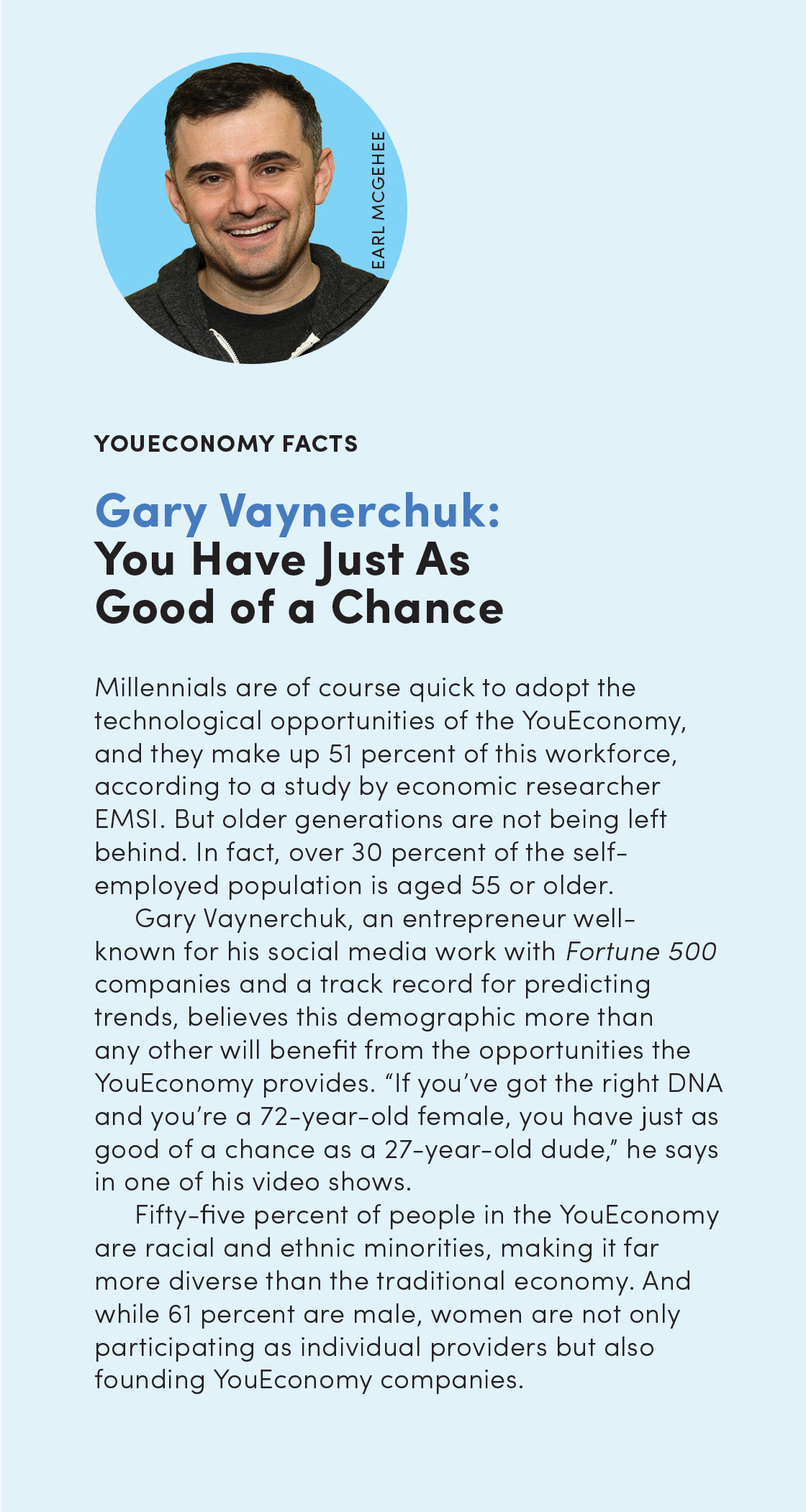
For Eric Johnson, the YouEconomy provided a way to start earning some extra money, learn new skills and create a strategy to achieve his independence. He sensed a round of layoffs coming at his office. But despite the writing on the wall at his own company, he didn’t want to jump to a similar situation at a different one. More and more often, large firms like his were outsourcing the kind of work he did—designing ads.
After months of stressing over his future, he went online. Using gig websites such as Upwork and Fiverr, Johnson started bidding on small jobs. Putting in extra time on the weekends for several months, he was able to build a small client list and earned positive feedback he could use as testimonials.
He built a website and posted his testimonials. Then he went to Udemy, an online learning site, to find a course on how to start a freelance business. He learned business skills such as bookkeeping and goal-setting. He read a book on building confidence and a series of magazine articles on reinvention and personal development. And by the end of a year, Johnson, who had saved most of the income he earned from his side hustle as a graphic designer, quit his job at the ad firm and launched full time as a freelancer.
“It was the best—and scariest—day of my life,” Johnson says, “but I knew I was doing the right thing. I finally had control of who I worked with and what I worked on. I finally had control of my own life.”
Like Johnson, Tameka Collins has reinvented herself in the YouEconomy. When she lost her job at a large public relations firm, she at first began taking on YouEconomy work to bridge the gap until she could land another position in PR, her college major. But through a combination of driving for Lyft during surge hours, tutoring the children of people in her church network in English and taking on short-term contract work in PR, she is now making almost 150 percent of what she made with her salaried position, and even has time to serve as a volunteer librarian at her daughter’s school three days a week and take an active role in the Parent Teacher Association.
“I really only thought of this as short term,” Collins says. “I thought, I got this degree in PR, I paid for college; I better use it. But part of my education was learning how to manage a schedule of things I have to get done and to take care of myself. And I know I’m doing that now. On my time, too.”
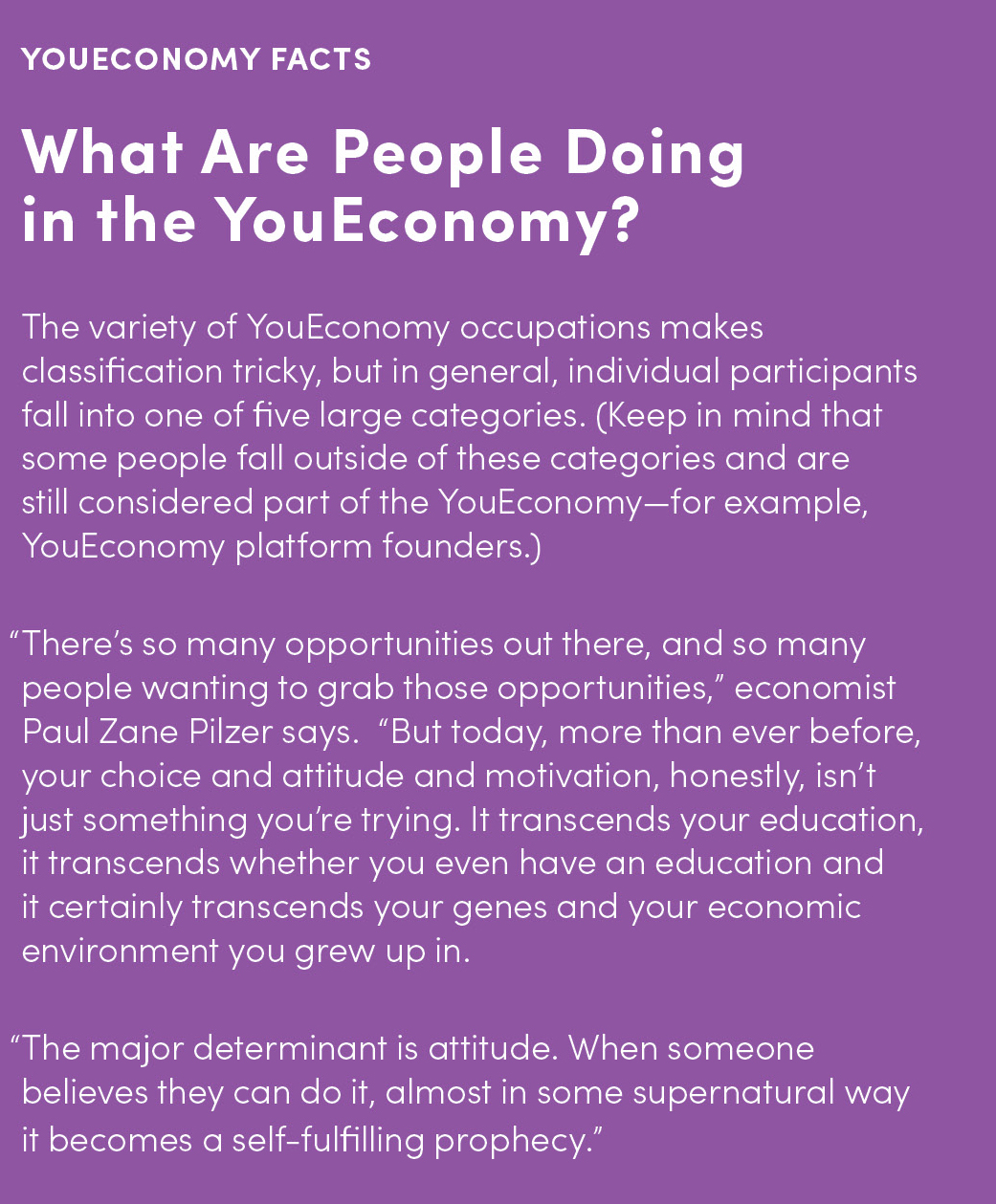
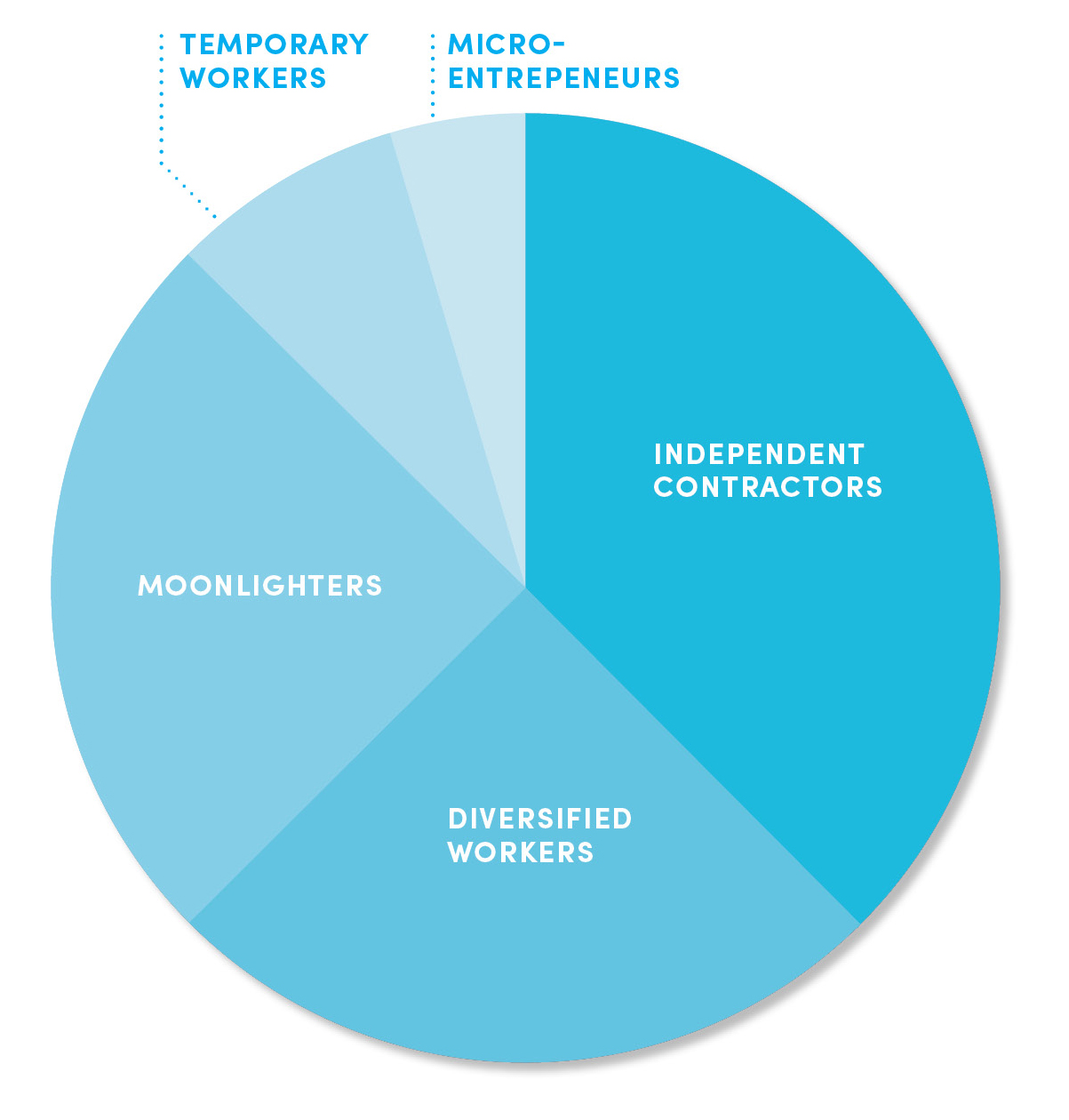

If you’re like Johnson and Collins and are longing for more control over some aspect of your life, the YouEconomy offers you tools to claim that control. From side-hustle opportunities, freelance gigs and shared ways of earning money, the options for increasing your income are endless. If you decide to work full time at your YouEconomy pursuit, you could outpace your current salary.
Related: Everything You Need to Know About the YouEconomy
Like Johnson, you might need to invest some time up front before you’re ready to make the leap to full time, but you might not. Collins leveraged assets she already had—such as her car, her strong language skills and her public relations experience—to put together a thriving YouEconomy lifestyle on the fly.
From Airbnb to JustPark, there are multiple applications devoted to helping you earn some extra cash by simply sharing what you already own, like a house or a parking space. Ask around and you’ll be surprised at how many people have already either rented out their home or rented someone else’s place while traveling. You can share your car through Zipcar, your tools through NeighborGoods, and even your dog-walking chores through Rover.
Often people who participate in the sharing opportunities of the YouEconomy aren’t looking to leave a full-time job they’re happy with but hope to supplement their income and meet some interesting people along the way.
Today, Johnson sets his own hours. As a night owl, this is great for him because he can check emails around lunchtime and work on projects through the evening. Then his nights are free to spend with friends.
Other people choose to participate in the YouEconomy because they want the flexibility to show up for lunch with their kids in the school cafeteria or to participate in daytime activities they enjoy. Maybe they work two different gigs—one in the morning and one on the weekends—so their afternoons and evenings are free. To supplement their gig income, they might share their parking space or sell knitted items on Etsy, a craft retail website.
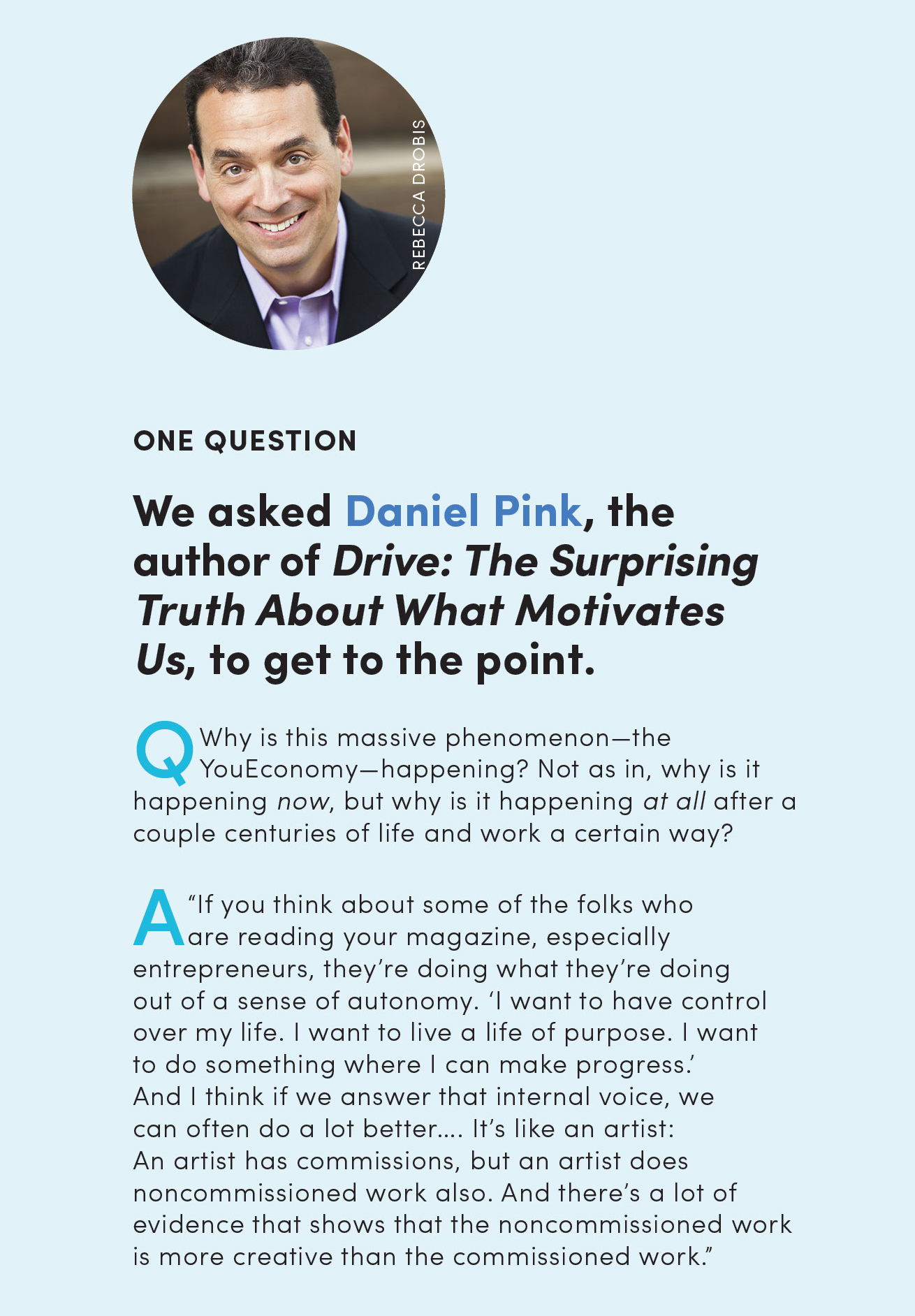
In fact, the chance to pursue passions and hobbies is another major driver for people to join the YouEconomy. Why spend all day working on projects that lack excitement or challenge? You could not only spend time doing what you love but also make a little extra money doing it. The Financial Times reports that more self-employed people in Europe and the U.S. say they enjoy their jobs than those who are traditionally employed. And Burson-Marsteller’s research shows that 71 percent of people participating in the YouEconomy have had positive experiences.
Above all of these reasons, the surprising perk for joining the YouEconomy is the chance to meet and interact with others who share your values, interests and passion for independence.
So the next question is this: Why is now the best time to join the YouEconomy?
The Choice Is Yours
Have you heard the term company man? It used to mean a full-time employee who spent his entire adult life working for the same company. This was the guy who got a gold watch and a party to mark his retirement. This guy hasn’t been around for a couple of decades now.
Instead, people work in ways that fit with their lives and their missions. And companies hire in ways that fit with their changing needs and bottom lines. Let’s start with employees.
If you can remember a time when having more than two or three jobs on your résumé was embarrassing, then you may need to adjust your mindset. Today’s workforce no longer strives for longevity in working relationships; workers now strive for personal excellence. This requires constantly enhancing skill sets and knowledge bases. The only way to do that well is to experience a variety of approaches, systems and mentors. So today’s résumé reads more like a menu of jobs rather than an overview of one company relationship.
In fact, some people are creating résumés that look like they belong to two or three different people in different careers. Switching industries and skill sets isn’t uncommon anymore. So if you find yourself 10 or 20 years into your career and wish you’d gone in another direction, it’s not too late.
The YouEconomy is the result—and now the supporter—of this desire to recreate ourselves. We no longer have to fit into a corporate mold that lasts a lifetime. Nor do we need to stick with the field we studied in college or the job title we’ve worked under for five years. The YouEconomy has returned our power of choice.
More and more, workers expect to participate in projects that challenge them, to work in environments that support their well-being, and to feel a sense of meaning and purpose in their day-to-day lives. This means that employees aren’t satisfied with what used to be seen as the brass ring: a steady paycheck, a good benefits package and a company on solid financial footing. While all of this is still nice, it isn’t an assurance of security.
The recent economic recession proved that what seemed like companies on solid financial footing could, within days, become bankrupt. That what we thought were assurances were really just temporary measures. And that jobs were no guarantee of anything.
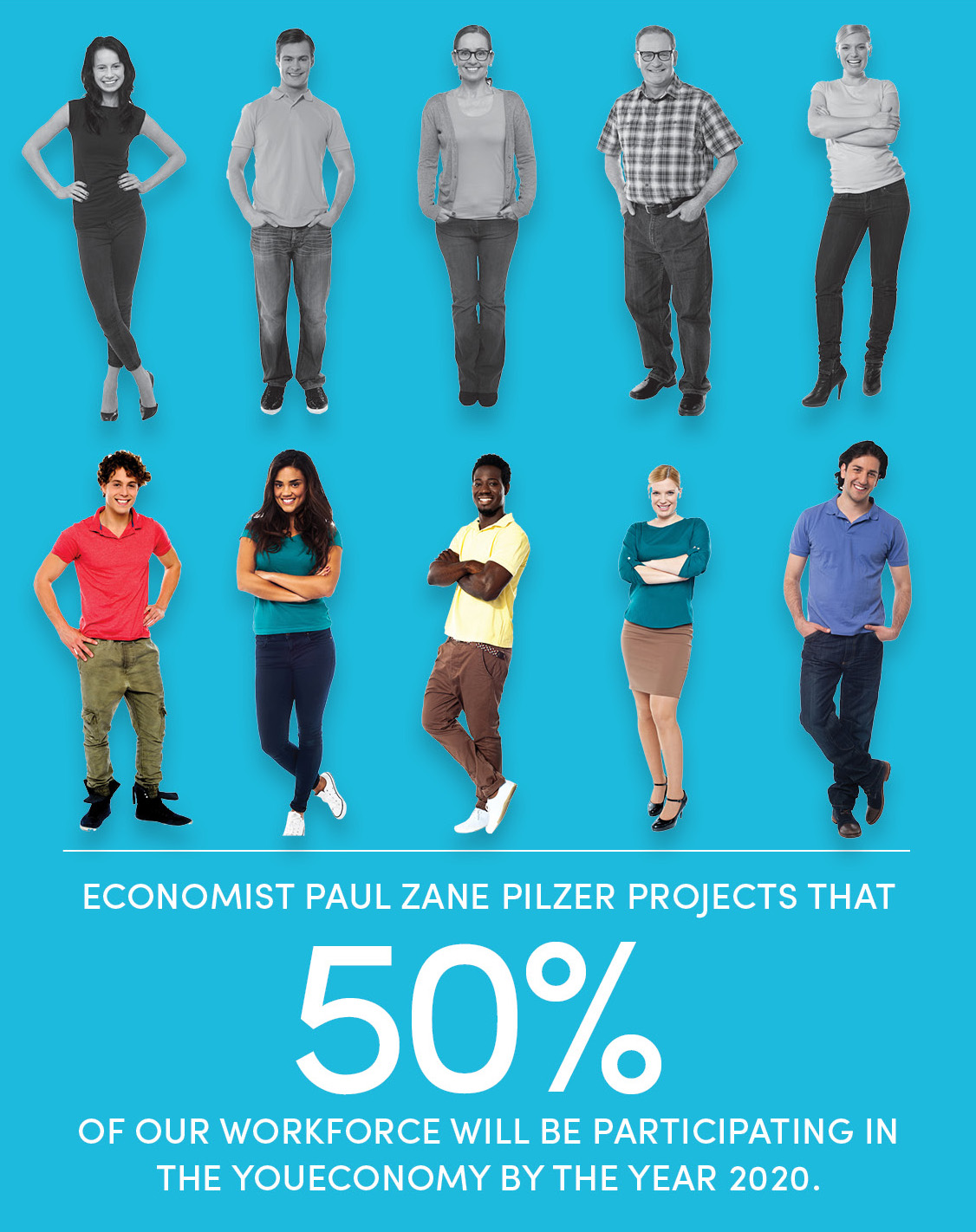
As people were laid off or simply handed their last paychecks from folding businesses, they realized that if they wanted security, they’d have to provide it for themselves. The YouEconomy offered hope and happiness.
Those companies that survived desperate times in the last decade have had to rethink how they’re managing their resources. That includes people. Having lifelong employees with a relatively fixed skill set and a huge financial benefits package doesn’t make sense anymore. Instead, contractors, consultants and freelancers are working side by side with companies that, in some cases, once employed them full time.
This change in the corporate approach to hiring means that anyone still working a full-time job is actually in real jeopardy of losing that seemingly secure job in favor of a more convenient, more economical contract worker. A 2010 study by Intuit found that that by 2020, 40 percent of our workforce will be composed of independent contractors. But recent technological and entrepreneurial progress has hastened things. The effect of this development on a macroeconomic level is massive.
Renowned economist and best-selling author Paul Zane Pilzer tells SUCCESS that, according to his research, by 2020 “at least half of the then-130 million U.S. households will be participating in the YouEconomy. These households represent approximately 127 million American adults inside a 255 million adult population. An astonishing 47 million adults will join the YouEconomy in just the next five years.”
So if you haven’t thought about how you’re going to join the YouEconomy, how much longer can you afford to wait?
A longtime friend of SUCCESS, business coach Tory Johnson entered the YouEconomy by accident, when she was let go from her role in NBC’s media relations department. On her final day, the manager who let Johnson go invited her to “explore the world” as an offer of reassurance. Soon enough, joining the ranks of what we now call the YouEconomy allowed her the strength to do just that.
“I didn’t want to explore anything except my apartment in my pajamas,” Johnson says. “And I hid for months until I ran out of money. I realized that I had two choices: Pack up and move from New York City back home to Miami Beach, which I definitely didn’t want to do, or snap out of it and find another job. And only then did I realize that you could take away my business cards and my corporate I.D. and my paycheck, but nobody could strip me of my skills.… I owned them and it was time that I stood up and stood proud about what I could accomplish.”
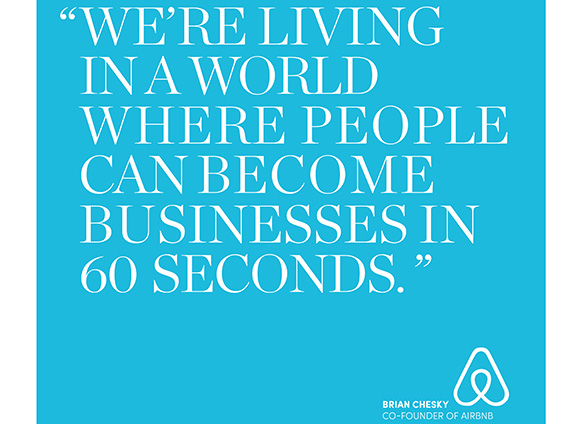
What to Do
Like Eric Johnson and Tameka Collins, you might have an idea of how you can join the YouEconomy. But not everyone does. Sometimes it takes seeing the options before you realize what you want. Fortunately, there are a lot of options.
Sharing:
One of the most talked-about aspects of the YouEconomy is the sharing or shared division of opportunities. Essentially, this means that people are selling time or assets to others, usually through an existing platform like a website or mobile application. We’ve already seen a few examples, but there are many more. TaskRabbit, Handy and Moonlighting are websites that help people sell their time performing both skilled and unskilled jobs like running errands, completing home repairs or putting together IKEA furniture. And you don’t need a platform to participate. But keep in mind that if you want to rent your carpet cleaner to someone, an existing platform might have some security measures in place to protect you, such as background checks or payment systems.
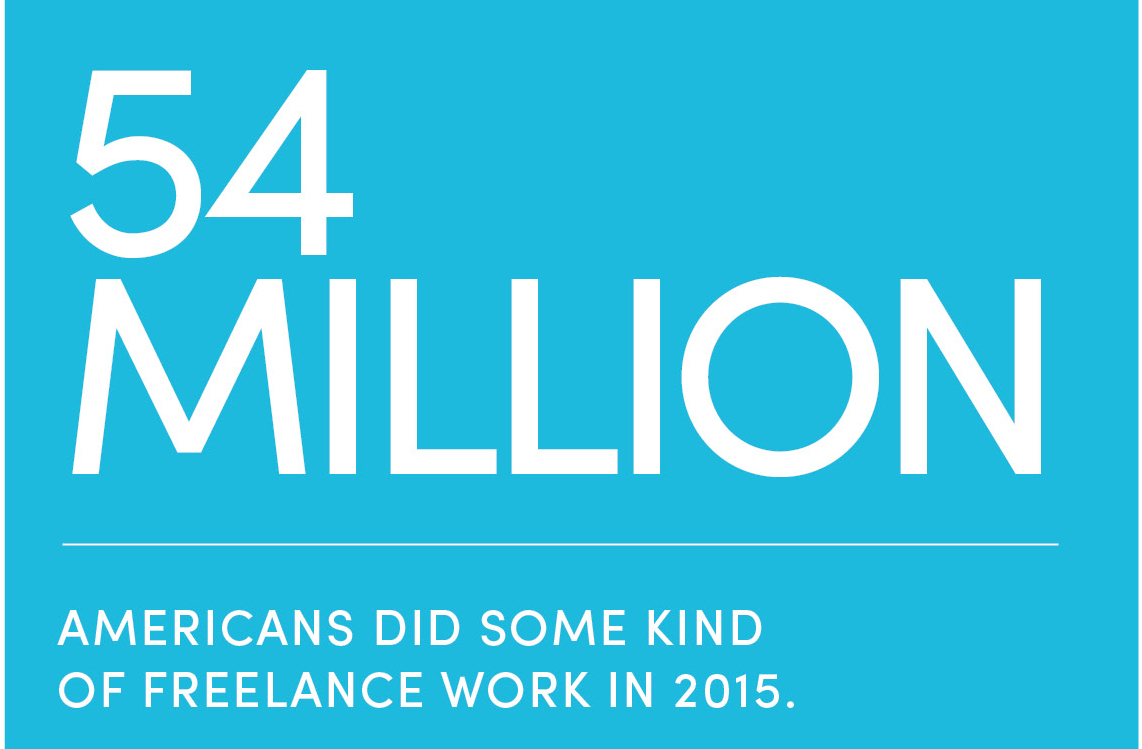
If sharing in the YouEconomy appeals to you, ask yourself what asset or service you have to offer. Then do an online search for an existing platform to help you market that item or service. If one doesn’t exist, maybe you could create one. (Innovation is at the heart of the YouEconomy.)
“I had a professor who told me, ‘If you can imagine it, you can create it,’ ” says Airbnb founder Brian Chesky, certainly a YouEconomy innovator. “Over the past 15 years, I haven’t been able to quite defy that principle, especially with Airbnb. It’s why I tell everyone at the company to not edit their imaginations. Too often we start with what is possible. But if you start there, you limit yourself and the possibilities.”
Speaking at the 2014 Aspen Ideas Festival, Chesky laid out in plain terms the sheer scope of the YouEconomy’s impact: “We used to live in a world where there were people, private citizens, [and] a world where there are businesses. Now we’re living in a world where people can become businesses in 60 seconds.”
Gigs:
Like Johnson, you may have a skill that is in demand. Whether you got your degree in the field or just have years of experience in executing a particular skill set, you can market your services on a gig basis. This means that you’d either set yourself up as a freelancer or participate in the gig websites that connect workers with clients in need of that particular skill, such as Freelancer, 99designs and Toptal. This option is great for creative types such as writers, designers and stylists, as well as for technical freelancers like coders and web developers through sites such as Guru or Topcoder.
According to a 2015 independent study commissioned by the Freelancers Union & Upwork, 54 million Americans did some kind of freelance work in 2015. A growing portion of this freelance group is the consultant. Providing specialized topic-related advice, business coaching or personal coaching, consultants work on a project basis with clients they find either through their own marketing or through coaching certification programs.
If you have an entrepreneurial dream, find someone who’s done it and ask them how they started. The small business dream has never been more attainable.
One of the biggest assets for freelancers and other gig workers is the vast amount of training available online. We’ll talk more about this in a few pages, but for now, don’t let your outdated coding skills or rusty foreign-language vocabulary hold you back. There are resources you can use to brush up your talent and be competitive as a freelancer no matter how much experience you have.
Marketplace:
Calling all craftspeople, resellers and flea-market fans! There is a thriving online market for what you have to offer, whether that’s a refurbished sofa, a handmade necklace or an album collection. The marketplace of the YouEconomy is worldwide in most cases and has created endless clientele for providers of goods—both homemade and manufactured. No longer are goods sold only by those big companies who can afford distribution contracts. Today, anyone, anywhere, can sell something to someone else.
Sites such as Etsy, eBay and Amazon Marketplace provide easy, proven methods for safely selling your goods to strangers. Other sites like iStock, CafePress and Nasty Gal also offer niche markets for anything from digital photos to vintage clothing. If you’ve got a garage full of used treasures or a treasure trove of great ideas for new stuff, you can sell it online. Even free sites such as Craigslist (a compendium of classifieds by city) offer opportunities for sellers, but remain aware that with these sites your common sense is the only protection against fraud or other crimes. Another option is to head over to Facebook and join a local garage sale page, where you can post pictures of your items and allow “porch pick up” by buyers.
Online Marketing:
Closely related to the online seller’s marketplace is the online marketer. These folks sell other people’s goods and services through an affiliate arrangement (many of them also sell their own goods and services as well). Looking for a great book on social media marketing? Your favorite blogger might have a suggestion. Click on the link for the recommended book, buy it, and that same blogger will make a little money off of your purchase.
On a larger scale, affiliate marketing can be quite lucrative, but you can start at any scale. If you have an online presence and feel strongly about certain products or services provided by others, you can become an affiliate by either checking with the original seller or with affiliate sites such as ClickBank and CJ (formerly Commission Junction), which are like catalogs of available affiliate relationships. Amazon, the online giant and one of the pillars of the YouEconomy even amidst controversy, is one of the most common affiliate partners.
Entrepreneurship:
Business ownership isn’t new, but the ways in which entrepreneurs are setting up shop and spreading the word have been revolutionized by technology. Whether you want to buy a franchise, start your own small firm or microbusiness, or dream of a mom-and-pop storefront in your local area, you can put the technology of the YouEconomy to use in ways your mom and pop never imagined.
Social media as a marketing tool has leveled the playing field for small businesses that want to compete with larger companies. While budgets may be smaller, the reach potential is far greater than ever before. Engaging people in a personal, day-to-day way has opened the door to client relationships that are faster and stronger than when we had to rely on direct mail or cold calls for those initial impressions.
In addition, entrepreneurs are taking advantage of app development to create constant reminders of their services and benefits to every customer with a smartphone. According to the Kleiner Perkins Caufield & Byers annual Internet Trends report, the average person checks his or her phone every six minutes, about 150 times per day; this is a huge opportunity to engage with people and become an essential part of their daily lives. And GPS technology allows brick-and-mortar business owners to cash in on nearby clients through an appeal to convenience.
“Thinking about your own business is quite empowering,” Vaynerchuk says. “Sure, I’m probably working way harder than people who work 9-to-5, but I’m doing that happily.”
If you have an entrepreneurial dream, find someone who’s done it and ask how they started. The small-business dream has never been more attainable.
Direct Selling:
If the idea of a microbusiness sounds appealing, but you’re not sure how to begin, direct selling (or network marketing, as it is also known) might be the gateway to your entrepreneurial journey. Founded on social selling, these companies provide products and services backed by research, funding and fully formed marketing systems to entrepreneurs who are excited to spread their wings and be independent. The individual entrepreneur has constant access to the marketing, support and technical resources of the company providing the products or services.
Direct selling is one of the industries that best leverages social media to market and even sell. This means the financial cost of getting started is minimal. For folks who want to own their own businesses, this low-cost, easy-to-earn and supportive system is like joining a family business that’s already proven. If you dream of taking control of your time and money but aren’t prepared to take the risk of solo entrepreneurship, ask someone you know who’s already in direct selling to show you how he or she got started.
The late Jim Rohn, an iconic motivational speaker, is one example of a direct selling success story. Many of his lessons are used today to empower independent salespeople around the world. Among the advantages to direct selling that he espoused were its low cost of entry and limitless potential for the motivated salesperson. “There are some steps in between desire and riches,” he once said, “but you begin with the desire. And that’s what’s phenomenal about network marketing, a chance to turn pennies into a fortune, a chance to turn nothing into something, a chance to truly make the American dream come true by participating in capitalism at the grassroots level.”
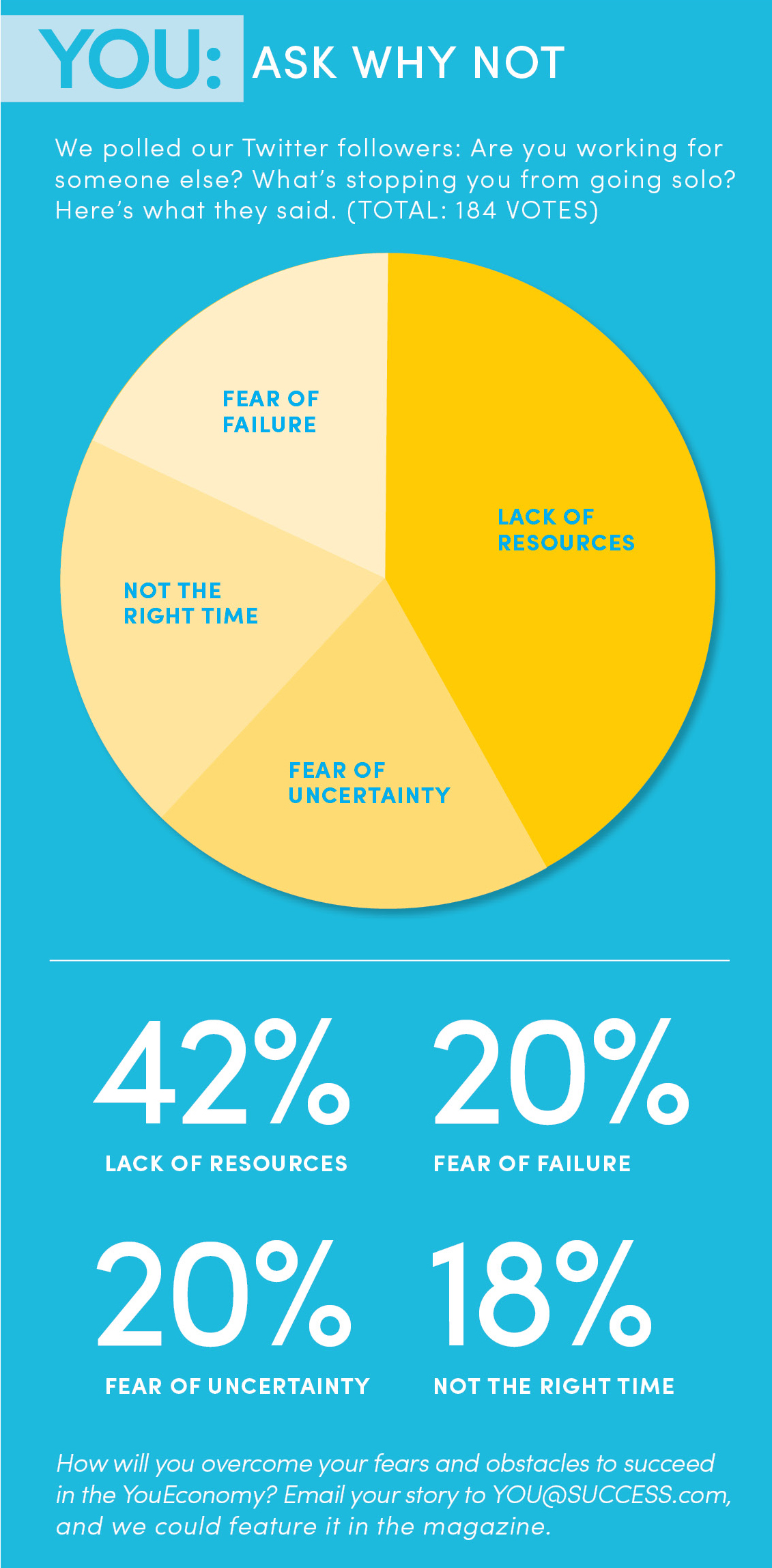
Platform Company:
Some of the biggest successes in the YouEconomy are individuals who started small businesses that later grew into large companies that support the YouEconomy itself. Take Uber, for example. The owners had a traditional car service but tapped into the technology now available, developed an app for their clients and then shared that app with other companies. And voilà: a multinational corporation that is a major contributor to the very economy that spawned it in the first place. Airbnb and Rent the Runway have followed similar paths.
Innovative company owners are creating a solid foundation for the continued progress of the YouEconomy by allowing individuals to follow their own pursuits in new ways. These companies are weaving a web of support through technology and opportunity that spreads further every day. If you have an idea for a new way of connecting buyers and sellers, now is the time to take your opportunity to market. Seed money for entrepreneurs and artists is much more easily accessible through crowdfunding sites such as Kickstarter, GoFundMe or Patreon, and the education you need is available online.
“I have a list of all the crazy interesting problems that I get to solve every day or that need to be solved,” Uber founder Travis Kalanick, probably the most well-known exploiter of the YouEconomy paradigm, told SUCCESS partner CNNMoney. “I [also] have a crazy list of things I’d like to invent… and it’s fun.”
Education:
Education and training is one of the fastest-growing segments of the YouEconomy. With so many entrepreneurs launching out on their own in some way, more and more people need training of some kind. From technical skills like how to code a website to personal development, the online education space is expanding by the day.
As a participant in the YouEconomy, this is good news (more about how to find the resources you need in the pages to come). For educators and trainers, it’s an opportunity to reach more people and effect greater change. Thanks to online storehouses of video courses such as Udemy and Skillshare, anyone can post their latest lessons. So if you have something to teach, grab a video camera and start teaching!
All of these approaches have different benefits for different reasons. In many cases, people in the YouEconomy are trying their hand at more than one method. Maybe you’re selling your mornings as an errand-runner on TaskRabbit, freelancing your time in the afternoons as a virtual assistant on eaHELP, and blogging as an affiliate marketer once a week so that, on weekends, you can rent your downtown apartment to convention attendees while you travel. This kind of mix might sound random, but at its core are people who have found what makes them happy, who are spending their time how and where they like, and are living full lives without being trapped by someone else’s idea of success.
Futurist Faith Popcorn has projected that the near horizon will see the rise of the “hyphenate,” a worker who will embrace multiple careers and lifestyles at the same time. Speaking at IBM’s PureMatter Thinkathon last year, the think tank founder highlighted individuals such as Justin Timberlake (performer-startup investor) and 2 Chainz (rapper-cookbook author). She sees a day when powerful virtual “matching engines” pair freelancers with companies that have immediate needs, allowing the YouEconomy worker to share skills from the comfort of the couch.
More than a decade ago, Fortune heralded the arrival of this 1099 world, advising readers to forget their paychecks and W-2 forms. Popcorn puts it even more simply: “Careers are over.”
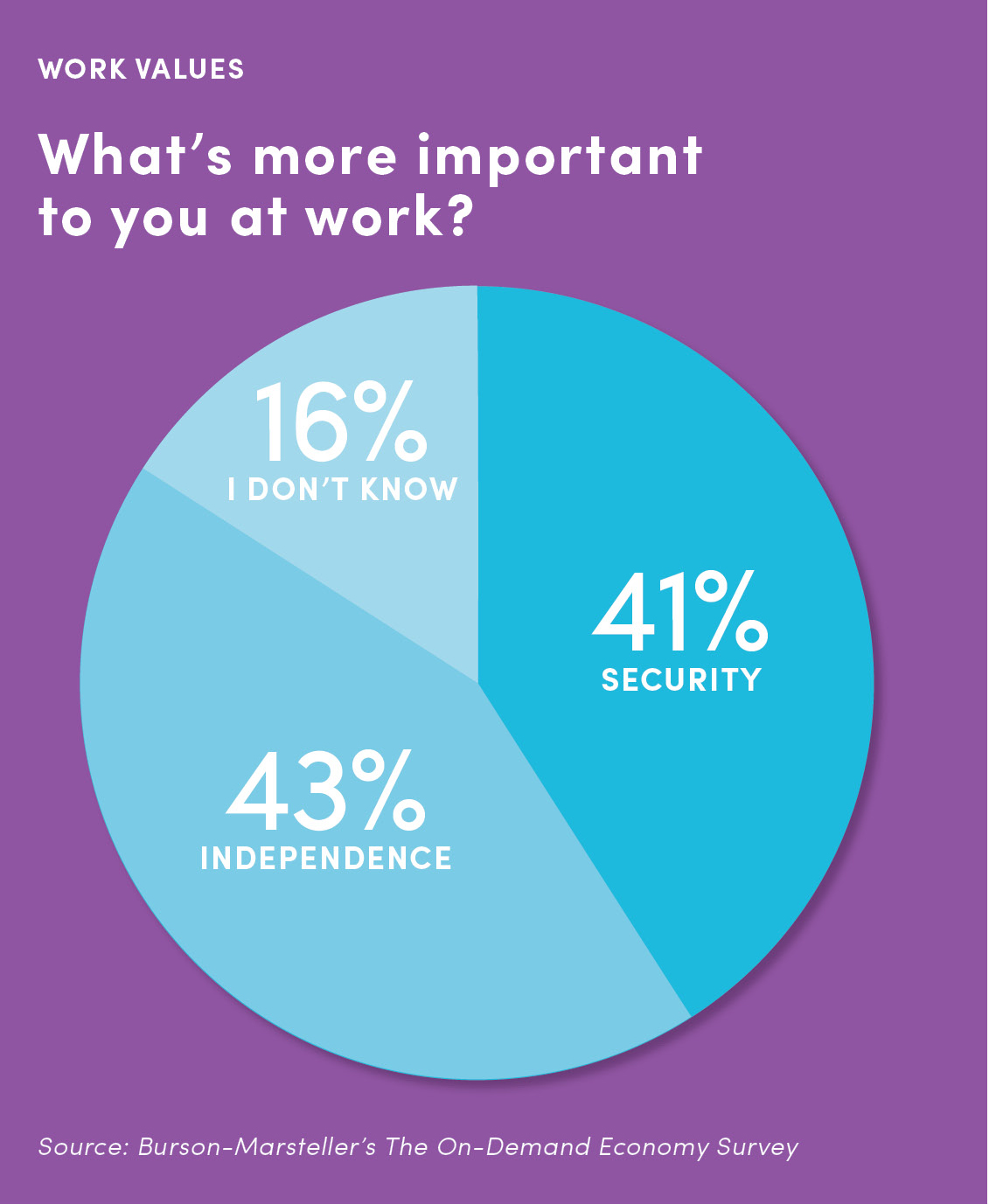
How to Start
OK, so if all of this talk about owning your time and deciding how much money you make and spending time with like-minded people has you excited, then let’s get down to business. How in the world do you start?
First, evaluate your potential. Review the entry points we’ve listed over the last few pages and note the methods that appeal to you. Then ask yourself if you have what it takes to do this or whether it makes sense for your life goals. For example, if you’re someone who loves to travel, then renting out your apartment on weekends might be a fun start. But if your dream is to spend more time at home in your garden, then you’ll want to consider making that garden part of your plan—perhaps growing vegetables this year and running a little stand at your local farmers market.
If your goal is to support your family through the YouEconomy, you’ll need to think bigger. Direct selling or another entrepreneurial venture is a good idea for those who like independence, and freelancing can bring a healthy income if you have an in-demand skill.
Consider your passion. Is it writing, or music, or helping others? Are you in love with a product or an idea you want to share with others? Integrating your passion into your YouEconomy endeavor is the key to a lasting journey as you set out on your own.
Once you have a couple of ideas about where you might want to invest your time in the YouEconomy, your next step is to evaluate your skill set.
“You’ve got to always work, always be learning…. Always be grinding.”
Even if you have a talent, like graphic designer Eric Johnson, there are other areas you may need to bolster with additional training. Being a freelancer requires some business and marketing savvy, as well as talent. Selling your homemade items on Etsy requires knowledge of basic bookkeeping and customer service practices. And working independently in any way requires personal development you might not have needed while taking orders from a boss.
Tameka Collins had never given personal development content much thought until she realized it armed her with the soft skills to win in the YouEconomy. Finding herself bored during late-night Lyft driving, Collins began listening to motivational MP3s between fares. She says the lessons they have instilled have carried over to her daytime work as a contract PR pro.
“Motivation and productivity are the main ones I like,” Collins says. “When you’re on your own working for yourself, you start finding these ways to push further and harder than you ever would have in an 8-to-5 job. At the end of the day, you’re the one who’s going to benefit. I get this feeling—they call it flow—where I just want to do more and more and I feel like my work is better and better. I have energy doing this.”
In some cases, motivation is the only thing limiting how much an individual can make in the YouEconomy. But that’s not altogether different from traditional entrepreneurship.
“Always be grinding,” advises entrepreneur, Shark Tank investor and Dallas Mavericks owner Mark Cuban. The mantra makes up his core philosophy of self-made success. “You’ve got to always work, always be learning…. And so you’ve got to recognize that you’ve got to grind, and you’ve got to compete and you’ve got to sell and you’ve got to re-evaluate and re-earn your business every day.”
Many people new to setting their own schedules or directing their own professional training feel overwhelmed or not up to the task. In fact, most people list self-doubt and fear of failure as the main reasons they don’t go launch out on their own. It’s why Eric Johnson waded into the YouEconomy waters at first.
If you’re feeling these fears, you’re not alone.
The good news is that the YouEconomy removes a lot of the risk that used to be associated with taking control of your career. By offering side gigs that create a steady buildup of income, you could gradually make the leap into a full-time independent life. Direct selling and franchise operations offer support through companies proven in their industries. And freelancers and entrepreneurs alike find education and personal development through a number of resources.
If you’re in need of self-discipline, clarity of vision or just basic business skills, the resources offered through SUCCESS will help. The magazine, SUCCESS-published books, SUCCESS Talks audio programs, web content and digital learning courses are all affordable, easy-to-use options that will make an enormous impact on your perspective and your outcomes.
Remember that part of your journey in the YouEconomy isn’t just financial or occupational; it’s also emotional, mental and spiritual. By seeking a new way of spending your time and applying your talents or personality assets, you can create a life uniquely your own. You can expand your perspective, find new joy and discover what gives you a sense of fulfillment and purpose.
When you were a kid, did you dream of spending your days in a crowded office or fighting through traffic both ways on your commute? Did you envision yourself halfheartedly serving the ideas of your boss or being forced to play corporate politics? Did you think you would be scraping together crumbs from your paychecks just so you could afford to take your family on one vacation a year?
When you were a kid, did you imagine being an adult would be better than this?
It can be. The YouEconomy is about far more than money, flexibility or self-reliance. It’s the opportunity for growth, innovation and creating a legacy. Your place in the YouEconomy can’t be filled by anyone else. The world is waiting for your skills, your ideas, your smile. Are you ready to step up? It’s time to claim your place in the YouEconomy today.
Related: Do You Have What It Takes to Be a Part of the YouEconomy?
*Some names have been changed to protect privacy.
For more information on the future of the YouEconomy and your place in it, visit SUCCESS.com/YouEconomy, and be on the lookout for the full book from the editors of SUCCESS.
This article originally appeared in the August 2016 issue of SUCCESS magazine.


